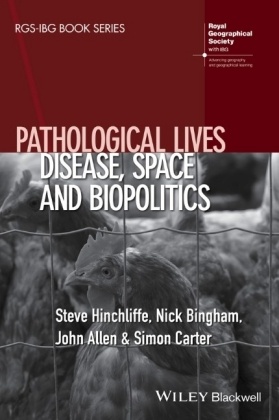Ulteriori informazioni
Informationen zum Autor Steve Hinchliffe is Professor of Human Geography at Exeter University, UK. He is an elected Fellow of the Academy of Social Sciences and author and editor of numerous books and articles on issues ranging from risk and food, to biosecurity, urban ecologies and nature conservation. He sits on the UK's Food Standards Agency Social Science Research Committee and has advised DEFRA on responses to exotic disease events. Nick Bingham is a Senior Lecturer in the Faculty of Social Sciences, The Open University, UK. Nick's current areas of research focus include the management of food safety, responses to the pollination crisis, and matters of coordination in smart cities. He is the author of numerous journal articles and book chapters and is joint editor of Contested Environments (with Andrew Blowers and Chris Belshaw, 2003). John Allen is Professor of Economic Geography in the Faculty of Social Sciences, The Open University, UK. His teaching and research experience includes work on issues of power and spatiality, more recently in relation to financialization, privatization, biopower and topology. His publications include Lost Geographies of Power ( Oxford, Blackwell, 2003) and Topologies of Power: Beyond Territory and Networks (2016), in addition to numerous authored and edited books. Simon Carter is a Senior Lecturer in the Faculty of Social Sciences, The Open University, UK. Hisresearch interests are in Science and Technology Studies, especially as applied to issues of health and medicine. Most recently, he has been working on an ESRC funded study into how biosecurity interfaces with other concerns in our globalized world. He is the author of Rise and Shine (2007) as well as numerous book chapters and journal articles. Klappentext Pandemics, epidemics and food borne diseases are a major global challenge. Focusing on the food and farming sector, and mobilising social theory as well as empirical enquiry, Pathological Lives investigates current approaches to biosecurity and ask how pathological lives can be successfully 'regulated' without making life more dangerous as a result.* Uses empirical and social theoretical resources developed in the course of a 40-month research project entitled 'Biosecurity borderlands'* Focuses on the food and farming sector, where the generation and subsequent transmission of disease has the ability to reach pandemic proportions* Demonstrates the importance of a geographical and spatial analysis, drawing together social, material and biological approaches, as well as national and international examples* The book makes three main conceptual contributions, reconceptualising disease as situated matters, the spatial or topological analysis of situations and a reformulation of biopolitics* Uniquely brings together conceptual development with empirically and politically informed work on infectious and zoonotic disease, to produce a timely and important contribution to both social science and to policy debate Zusammenfassung Pandemics, epidemics and food borne diseases have become one of the key challenges for contemporary global society. The central claim of Pathological Lives is that any solution offered to these kinds of emerging and often communicable diseases requires a broad-based geographical scrutiny. Inhaltsverzeichnis List of Figures ix Series Editors' Preface x Acknowledgements xi Foreword xiii Part I Framing Pathological Lives 1 1 Pathological Lives - Disease, Space and Biopolitics 3 Introduction: The Emergency of Emergent Infectious Diseases 3 The Four Moves of Pathological Lives 8 References 21 2 Biosecurity and the Diagramming of Disease 25 Disease Diagrams 27 The Disease Multiple: Germs and the Return of the Outside 31 Biosecurity and the Diagra...

